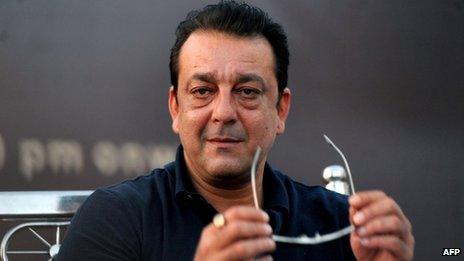Sanjay Dutt: India Bollywood actor moved to Pune's Yerwada jail
- Published

Sanjay Dutt is hugely popular for his role of a loveable gangster in Munnabhai movies
Bollywood star Sanjay Dutt has been moved to Pune's Yerwada jail where he will finish his sentence for firearms offences linked to blasts which killed 257 people in Mumbai in 1993.
The actor gave himself up last week and was initially housed in Mumbai's Arthur Road prison.
A court has allowed him access to medicines and food from home during his stay in the prison.
He has already served 18 months of his five-year term.
The actor was convicted for illegally possessing a rifle and a pistol which he bought from the bombers.
He had sought to delay his return to prison to finish a number of films, but the court rejected his appeal.
The 53-year-old actor has been allowed to take with him copies of the Bhagvad Gita, Ramayan and Hanuman Chalisa - all Hindu religious texts - in addition to clothes, slippers, a mattress, pillow, fan and toiletries, including toothpaste and shampoo.
However, Dutt's request to take an electronic cigarette with him was rejected by the judge who instead advised him to quit smoking.
Dutt was convicted in 2006 of buying arms from the bombers but cleared of conspiracy. The attacks left 713 others injured.
The son of a Hindu father and a Muslim mother, Dutt said the weapons were necessary in order to defend his family during the Hindu-Muslim rioting of 1993 which followed the destruction by Hindu zealots of the Babri mosque in the northern town of Ayodhya.
Dutt, one of Bollywood's most bankable stars, is hugely popular for his role as a lovable gangster in the Munnabhai movies. He has also dabbled in politics.
In 2006, a special anti-terror court convicted 100 people over the blasts. Twelve were given the death penalty and 20 others sentenced to life imprisonment.
Dutt, the most high-profile among the convicts, was originally charged with five offences, including criminal conspiracy and possession of illegal weapons.
In March 2013, India's Supreme Court upheld his conviction, but reduced his sentence from six to five years.
- Published28 March 2013
- Published21 March 2013
- Published21 March 2013
- Published17 May 2013